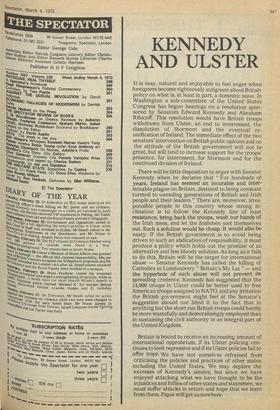KENNEDY AND ULSTER
It is easy, natural and enjoyable to feel anger when foreigners become righteously indignant about British policy on what is, at least in part, a domestic issue. In Washington a sub-committee of the United States Congress has begun hearings on a resolution sponsored by Senators Edward Kennedy and Abraham Ribicoff. This resolution would have British troops withdrawn from Ulster, an end to internment, the dissolution of Stormont and the eventual reunification of Ireland. The immediate effect of the two senators' intervention on British public opinion and on the attitude of the British government will not be great, but will tend to increase support for the troops' presence, for internment, for Stormont and for the continued division of Ireland.
There will be little disposition to argue with Senator Kennedy when he declares that "For hundreds of years, Ireland has seemed an incurable and interminable plague on Britain, destined to bring constant turmoil to unending generations of British and Irish people and their leaders." There are, moreover, irresponsible people in this country whose strong inclination is to follow the Kennedy line of least
resistance, bring back the troops, wash our hands of
the Irish mess, and let the Irishmen sort themselves
out. Such a solution would be cheap. It would also be
nasty. If the British government is to avoid being driven to such an abdication of responsibility, it must produce a policy which holds out the promise of an alternative and less bloody solution. As long as it fails to do this, Britain will be the target for international abuse — Senator Kennedy has called the killing of Catholics in Londonderry "Britain's My Lai " — and the hyperbole of such abuse will not prevent its spreading credence. Kennedy has suggested that the 14,000 troops in Ulster could be better used to free American troops assigned to NATO, and any irritation the British government might feel at the Senator's suggestion should not blind it to the fact that in anything but the short run British troops could hardly be more wastefully and demoralisingly employed than in sustaining the civil authority in an integral part of the United Kingdom.
Britain is bound to receive an increasing amount of international opprobrium, if its Ulster policing continues to look repressive and if its Ulster policies fail to offer hope. We have not ourselves refrained from criticising the policies and practices of other states. including the United States. We may deplore the excesses of Kennedy's similes; but since we have enjoyed attacking what we have thought to be the injustices and follies of other states and statesmen, we must suffer attacks in return and hope that we learn from them. Pique will get us nowhere.










































 Previous page
Previous page